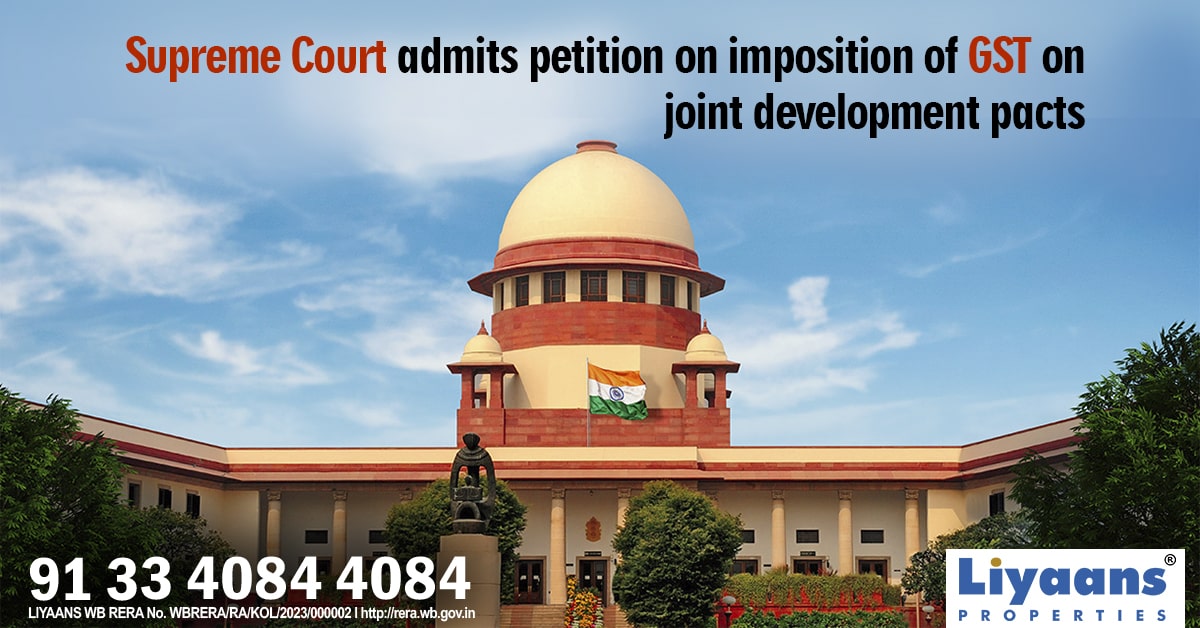Supreme Court Takes Up Legal Challenge to GST Taxes on Joint Development Deals
Posted Under Real Estate Rules & Regulations, GST, Real Estate On 14 May, 2024
The Supreme Court of India has admitted a petition challenging imposition of the GST on the transfer of development rights within joint development agreements between realty developers and landowners. In this matter, the court has issued notices to the Union government, GST Council and Central Board of Indirect Taxes and Customs (CBIC) to file their replies to the special leave petition (SLP) filed by a property developer in Telangana.
The applicability of 18% GST is poised to impact real estate projects across all major property markets nationwide marking a pivotal shift in the cost dynamics of joint developments and redevelopment projects as well.
After Losing Initial Challenge in Telangana High Court, Developer Appeals to Supreme Court Seeking Reversal on GST Tax Dispute.
While representing the developer, founder of legal firm, argued that in this case of barter, the moot point is whether the ancillary and incidental right attached to the sale of land would be subject to the GST as the supply of the land is specifically excluded from the purview of the GST.
The South India-based developer filed a writ petition back in 2020. This was in response to a GST notification that had been issued the previous year, in 2019. The notification established a point of taxation to impose GST on the transfer of development rights from a landowner to a real estate developer. The petition argued that this was essentially the government's way of trying to tax a transaction that was akin to the outright sale of the land itself.
Last year, real estate developers reached out to the Ministry of Finance with their concerns about the impact of the GST being charged on rehabilitation apartments. These are the apartments that are built and then handed over, free of cost, to existing occupants as part of redevelopment projects.
The projects involving joint development and redevelopment play a crucial role in the functionality of most property markets, especially given the backdrop of escalating land prices and the dwindling availability of vacant land parcels in key urban centres.
The issue relates to the levy of 18% GST on the value of development rights that will make various projects across key markets including Mumbai, Pune, Bengaluru, Hyderabad, and Kolkata unfeasible for all stakeholders including landowners.
The outcome of this case is likely to change the landscape of property development impacting stakeholders and reshaping strategies within the real estate sector.
By LNN (Liyaans News Network)
-
January 2026 (3)
-
November 2025 (3)
-
October 2025 (2)
-
September 2025 (1)
-
August 2025 (4)
-
July 2025 (2)
-
June 2025 (4)
-
May 2025 (3)
-
March 2025 (2)
-
February 2025 (5)
-
January 2025 (1)
-
December 2024 (3)
-
November 2024 (1)
-
October 2024 (2)
-
September 2024 (1)
-
August 2024 (1)
-
July 2024 (5)
-
June 2024 (2)
-
May 2024 (6)
-
March 2024 (2)
-
February 2024 (1)
-
January 2024 (3)
-
December 2023 (4)
-
November 2023 (3)
-
October 2023 (4)
-
August 2023 (4)
-
July 2023 (2)
-
June 2023 (4)
-
May 2023 (2)
-
April 2023 (2)
-
March 2023 (2)
-
January 2023 (1)
-
December 2022 (1)
-
November 2022 (1)
-
October 2022 (3)
-
September 2022 (3)
-
August 2022 (4)
-
July 2022 (5)
-
June 2022 (7)
-
May 2022 (2)
-
April 2022 (3)
-
March 2022 (6)
-
February 2022 (2)
-
January 2022 (7)
-
December 2021 (2)
-
November 2021 (4)
-
October 2021 (3)
-
September 2021 (4)
-
August 2021 (3)
-
July 2021 (3)
-
May 2021 (2)
-
April 2021 (1)
-
February 2021 (1)
-
January 2021 (1)
-
November 2020 (1)
-
October 2020 (1)
-
September 2020 (1)
-
August 2020 (3)
-
July 2020 (6)
-
June 2020 (4)
-
May 2020 (5)
-
April 2020 (5)
-
March 2020 (2)
-
February 2020 (3)
-
January 2020 (2)
-
December 2019 (4)
-
November 2019 (3)
-
October 2019 (1)
-
August 2019 (1)
-
July 2019 (1)
-
June 2019 (8)
-
May 2019 (5)
-
February 2019 (1)
-
January 2019 (1)
-
October 2018 (1)
-
September 2018 (3)
-
August 2018 (1)

